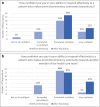Use of Simulated Patient Encounters to Teach Residents to Respond to Patients Who Discriminate Against Health Care Workers
- PMID: 30993630
- PMCID: PMC6502873
- DOI: 10.1007/s11606-019-04881-3
Use of Simulated Patient Encounters to Teach Residents to Respond to Patients Who Discriminate Against Health Care Workers
Abstract
Background: Previous studies indicate that medical trainees frequently experience discrimination by patients. Little is known about effective strategies to teach trainees to respond to this discrimination.
Aim: To create a workshop for first-year residents utilizing standardized patients to improve skills in responding to patients exhibiting discrimination towards members of the health care team.
Setting: The Patient Safety Training Center at Dartmouth-Hitchcock Medical Center in Lebanon, New Hampshire.
Participants: First-year residents in the Internal Medicine Residency Program.
Program description: An introductory didactic session including a communication skills framework was followed by simulated encounters with four standardized patients. Learners received feedback from a trained facilitator, peers, and the standardized patients.
Program evaluation: One hundred percent of the 19 learners who participated agreed that the simulated exercises were realistic and improved their readiness to address patient bias. The proportion of learners who reported being somewhat or very confident in their preparedness to respond to patients exhibiting discrimination increased from 74% before the workshop to 100% (p = 0.07) after the workshop.
Discussion: A workshop incorporating standardized patients may improve resident confidence in responding to patients with discriminatory behaviors. The workshop could be modified to incorporate other learners and staff, or for inter-disciplinary training.
Keywords: medical education-communication skills; medical education-graduate; medical education-simulation.
Conflict of interest statement
Dr. Kelly Kieffer received an honorarium in January 2017 from Medscape for an educational video supported by Abbvie and Pfizer. Dr. Ellen Eisenberg reports no potential conflicts of interest.
Figures
Comment in
-
Tackling Some Wicked Problems in Medical Education.J Gen Intern Med. 2019 May;34(5):652-653. doi: 10.1007/s11606-019-04930-x. J Gen Intern Med. 2019. PMID: 30993613 Free PMC article. No abstract available.
References
-
- Chen PW. When the patient is racist [Internet] New York: The New York Times; 2013.
-
- Novick DR. Racist patients often leave doctors at a loss [Internet] Washington DC: The Washington Post; 2017.
-
- Trogen B, Caplan A. When a patient is a bigot, what can a doctor do? [Internet] Chicago: Chicago Tribune; 2017.
-
- Reddy S. How doctors deal with racist patients [Internet] New York: Wall Street J; 2018.
Publication types
MeSH terms
LinkOut - more resources
Full Text Sources
Medical


